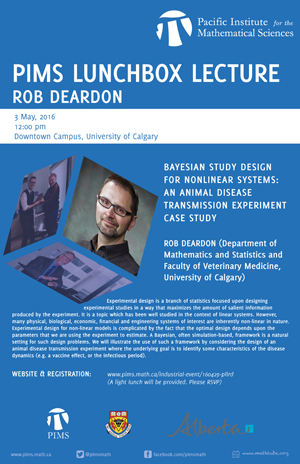PIMS Lunchbox Lecture: Rob Deardon
Topic
Speakers
Details
A video of this event is available on mathtube.org
Experimental design is a branch of statistics focused upon designing experimental studies in a way that maximizes the amount of salient information produced by the experiment. It is a topic which has been well studied in the context of linear systems. However, many physical, biological, economic, financial and engineering systems of interest are inherently non-linear in nature. Experimental design for non-linear models is complicated by the fact that the optimal design depends upon the parameters that we are using the experiment to estimate. A Bayesian, often simulation-based, framework is a natural setting for such design problems. We will illustrate the use of such a framework by considering the design of an animal disease transmission experiment where the underlying goal is to identify some characteristics of the disease dynamics (e.g. a vaccine effect, or the infectious period).
Additional Information
Location:
Downtown Campus, University of Calgary
Room 626, 907-8 Avenue SW
Lecture Time: 12:00pm
Rob Deardon, Department of Mathematics and Statistics and Faculty of Veterinary Medicine, University of Calgary
![]()
![]()

PIMS is grateful for the support of Alberta Innovation and Advanced Education, and the University of Calgary for their support of this series of lectures.

